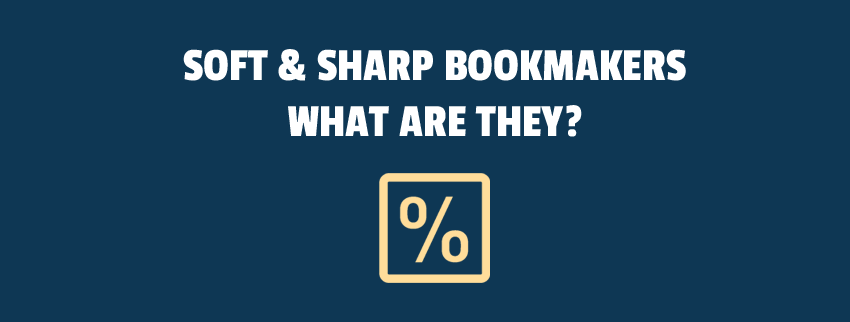If you've been reading about arbitrage betting or are a member of an arbing forum, you may have come across the terms soft and sharp bookmakers. These aren't very common terms in general betting but are useful to understand when arbing.
Let's take a look at what the terms mean.
Soft Bookmakers
A soft bookmaker is one who updates their odds at a generally slow rate. This means that a soft bookies odds may not reflect the true odds at a given time. This may be because a soft bookmaker has less sophisticated software and may have a more manual system of updating their odds.
Soft bookmakers odds can be minutes or even hours behind others and instead of keeping on top of current events which can cause changes in odds, they may simply follow other bookmakers who have more advanced systems to update their odds.
Many soft bookies have a higher margin than other bookmakers to compensate for their slow odds which means they generally offer the least value. However, as their odds often don't reflect the true odds, arbing software can find multiple opportunities to take advantage of their slow updates should the odds shorten with other bookmakers or betting exchanges.
Most casual punters tend to bet with soft bookies as they are generally the most well known brands in the industry.
Sharp Bookmakers
Sharp bookmakers are, as you may have guessed, the opposite to soft bookmakers. Sharp bookmakers update their odds extremely fast. For example, if a red card is shown in a football match, a sharp bookmaker would shorten the odds on the opposing team almost immediately whereas there may be a delay with a soft bookmaker updating their odds.
The process for updating the odds for sharp bookmakers is most likely always automated. As they can offer near-true odds, they are able to offer customers slightly better odds as standard and have a lower margin.
Sharp bookmakers tend to attract professional bettors who are looking for the best value and who are wagering large amounts.
Should you use soft or sharp bookmakers?
There are advantages to using both soft and sharp bookmakers in different circumstances.
Soft bookmakers tend to spend a lot more of their budget on advertising, affiliate networks and promotions such as free bets and bonuses. Any bookmaker which offers a lot of these are most likely a soft bookie. As matched bettors, we know that there is a lot of value in free bets and other offers and so that is one reason to use them.
Another reason is that because they can be slower to update their odds, there are often opportunities to make a profit from arbitrage betting.
For example, if a tennis match was taking place with the following prematch odds.
Sharp Bookie
- Player 1 odds: 1.95
- Player 2 odds: 1.95
Soft Bookie
- Player 1 odds: 1.95
- Player 2 odds: 1.95
And then during the match, Player 1 sprains their ankle, the sharp bookie would shorten the odds on Player 2 and increase the odds on Player 1. However, the soft bookie may not update their odds right away and so we may find odds available of something like:
Sharp Bookie
- Player 1 odds: 2.70
- Player 2 odds: 1.20
Soft Bookie
- Player 1 odds: 1.95
- Player 2 odds: 1.95
We could then back Player 1 at the sharp bookie and back player 2 at the soft bookie for a guaranteed profit regardless of the result.
Many profitable opportunities can be found like this using arbing software such as RebelBetting or BetSlayer.
One advantage of using sharp bookmakers is that they are less likely to impose stake limits or gub you. If a soft bookmaker suspects that you are arbing or matched betting, it's likely that you'll have your account limited in some way pretty quickly.
Both soft and sharp bookies have their advantages and for arbitrage bettors, the main advantage is using the two together due to their difference in odds.
Some examples of soft and sharp bookmakers can be found below
Soft Bookmakers
- William Hill
- Ladbrokes
- Coral
- Bet365
- Paddy Power
Sharp Bookmakers
- SBObet
- Pinnacle
- Betfair (exchange)
- Smarkets (exchange)
- Matchbook (exchange)
